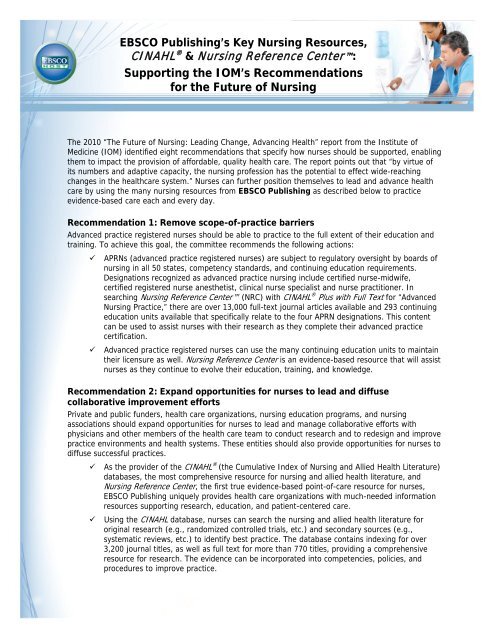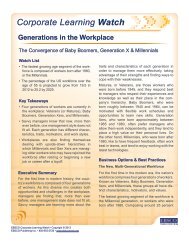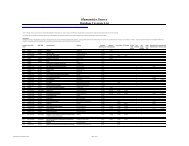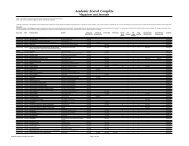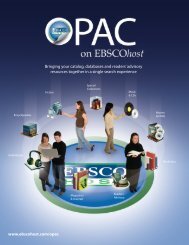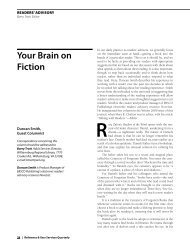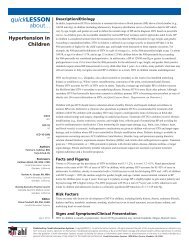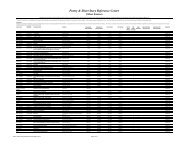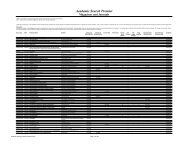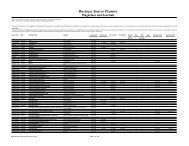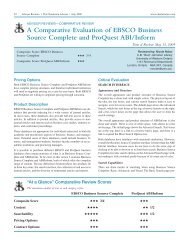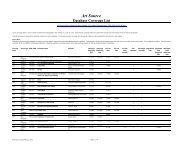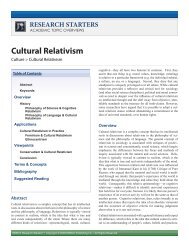CINAHL® & Nursing Reference Center™: - EBSCO Publishing
CINAHL® & Nursing Reference Center™: - EBSCO Publishing
CINAHL® & Nursing Reference Center™: - EBSCO Publishing
Create successful ePaper yourself
Turn your PDF publications into a flip-book with our unique Google optimized e-Paper software.
<strong>EBSCO</strong> <strong>Publishing</strong>’s Key <strong>Nursing</strong> Resources,<br />
CINAHL ® & <strong>Nursing</strong> <strong>Reference</strong> Center:<br />
Supporting the IOM’s Recommendations<br />
for the Future of <strong>Nursing</strong><br />
The 2010 “The Future of <strong>Nursing</strong>: Leading Change, Advancing Health” report from the Institute of<br />
Medicine (IOM) identified eight recommendations that specify how nurses should be supported, enabling<br />
them to impact the provision of affordable, quality health care. The report points out that “by virtue of<br />
its numbers and adaptive capacity, the nursing profession has the potential to effect wide-reaching<br />
changes in the healthcare system.” Nurses can further position themselves to lead and advance health<br />
care by using the many nursing resources from <strong>EBSCO</strong> <strong>Publishing</strong> as described below to practice<br />
evidence-based care each and every day.<br />
Recommendation 1: Remove scope-of-practice barriers<br />
Advanced practice registered nurses should be able to practice to the full extent of their education and<br />
training. To achieve this goal, the committee recommends the following actions:<br />
APRNs (advanced practice registered nurses) are subject to regulatory oversight by boards of<br />
nursing in all 50 states, competency standards, and continuing education requirements.<br />
Designations recognized as advanced practice nursing include certified nurse-midwife,<br />
certified registered nurse anesthetist, clinical nurse specialist and nurse practitioner. In<br />
searching <strong>Nursing</strong> <strong>Reference</strong> Center (NRC) with CINAHL ® Plus with Full Text for “Advanced<br />
<strong>Nursing</strong> Practice,” there are over 13,000 full-text journal articles available and 293 continuing<br />
education units available that specifically relate to the four APRN designations. This content<br />
can be used to assist nurses with their research as they complete their advanced practice<br />
certification.<br />
Advanced practice registered nurses can use the many continuing education units to maintain<br />
their licensure as well. <strong>Nursing</strong> <strong>Reference</strong> Center is an evidence-based resource that will assist<br />
nurses as they continue to evolve their education, training, and knowledge.<br />
Recommendation 2: Expand opportunities for nurses to lead and diffuse<br />
collaborative improvement efforts<br />
Private and public funders, health care organizations, nursing education programs, and nursing<br />
associations should expand opportunities for nurses to lead and manage collaborative efforts with<br />
physicians and other members of the health care team to conduct research and to redesign and improve<br />
practice environments and health systems. These entities should also provide opportunities for nurses to<br />
diffuse successful practices.<br />
As the provider of the CINAHL ® (the Cumulative Index of <strong>Nursing</strong> and Allied Health Literature)<br />
databases, the most comprehensive resource for nursing and allied health literature, and<br />
<strong>Nursing</strong> <strong>Reference</strong> Center, the first true evidence-based point-of-care resource for nurses,<br />
<strong>EBSCO</strong> <strong>Publishing</strong> uniquely provides health care organizations with much-needed information<br />
resources supporting research, education, and patient-centered care.<br />
Using the CINAHL database, nurses can search the nursing and allied health literature for<br />
original research (e.g., randomized controlled trials, etc.) and secondary sources (e.g.,<br />
systematic reviews, etc.) to identify best practice. The database contains indexing for over<br />
3,200 journal titles, as well as full text for more than 770 titles, providing a comprehensive<br />
resource for research. The evidence can be incorporated into competencies, policies, and<br />
procedures to improve practice.
<strong>Nursing</strong> <strong>Reference</strong> Center provides nurses with the opportunity to participate in professional<br />
development, and enables them to improve their leadership capabilities. Over 800 continuing<br />
education modules allow nurses to learn about areas of nursing care they might not cover in<br />
their own area of practice. Management papers, such as Conflict Management, Teambuilding,<br />
and Delegating Authority, can be referenced to assist new head nurses, supervisors, and<br />
managers in taking on additional responsibilities and collaborating with other members of the<br />
health care team. These resources can be shared among departmental folders for use by all<br />
staff nurses in daily practice, through journal club, or individual learning as desired.<br />
Through <strong>EBSCO</strong> <strong>Publishing</strong>’s 7-step evidence-based methodology, the evidence from<br />
databases such as CINAHL is selected, evaluated, appraised and synthesized into <strong>Nursing</strong><br />
<strong>Reference</strong> Center content, which directly supports practice recommendations. For example,<br />
the evidence-based care sheet, “Catheter-Related Bloodstream Infections (CRBSIs):<br />
Guidelines for Prevention,” identifies and synthesizes the latest relevant guidelines for<br />
infection prevention. The database is current and updated daily.<br />
By utilizing and embedding the latest evidence from <strong>Nursing</strong> <strong>Reference</strong> Center’s nursing<br />
practice and skill papers into practice within the organization, nurses can ensure they provide<br />
evidence-based care within their health care systems.<br />
More broadly, <strong>EBSCO</strong> <strong>Publishing</strong> is a provider of a suite of evidence-based resources to<br />
support not only nursing, but also clinical allied health, rehabilitation, and patient<br />
education needs covering the continuum of care. The suite of content is developed<br />
under an integrated editorial process, shared among a number of editorial teams.<br />
Recommendation 3: Implement nurse residency programs<br />
State boards of nursing, accrediting bodies, the federal government, and health care organizations<br />
should take actions to support nurses’ completion of a transition-to-practice program (nurse<br />
residency) after they have completed a prelicensure or advanced practice degree program, or when<br />
they are transitioning into new clinical areas.<br />
Over 800 nursing skills and their competency checklists in <strong>Nursing</strong> <strong>Reference</strong> Center can be<br />
used within the scope of a nursing residency program to support and evaluate learning<br />
through these programs.<br />
More broadly, the entire set of content in CINAHL and <strong>Nursing</strong> <strong>Reference</strong> Center can be used<br />
across the nurse residency curriculum:<br />
i. Research articles to support critical thinking and discussion around current practices,<br />
from more than 770 full-text titles<br />
ii. Articles supporting self-evaluation of such critical skills as communication among<br />
clinicians and patients<br />
iii. Quick lessons mapped to the nursing workflow to guide nurses in developing<br />
strategies to use in practice for assessment, diagnosis, planning, implementation, and<br />
evaluation<br />
Newer nurses to the profession may expect to access key information on the go. <strong>EBSCO</strong><br />
<strong>Publishing</strong> has provided <strong>Nursing</strong> <strong>Reference</strong> Center available via iPhone and iPad to meet this<br />
need.
Recommendation 4: Increase the proportion of nurses with a baccalaureate<br />
degree to 80 percent by 2020<br />
Academic nurse leaders across all schools of nursing should work together to increase the proportion<br />
of nurses with a baccalaureate degree from 50 to 80 percent by 2020. These leaders should partner<br />
with education accrediting bodies, private and public funders, and employers to ensure funding,<br />
monitor progress, and increase the diversity of students to create a workforce prepared to meet the<br />
demands of diverse populations across the lifespan.<br />
Health care organizations that provide nurses with access to CINAHL and <strong>Nursing</strong> <strong>Reference</strong><br />
Center, and support their integration and use in the nursing workflow, create a strong<br />
learning environment that helps to encourage nurses to want to formally continue their<br />
education.<br />
The CINAHL database is used in all nursing schools to support nursing education, research,<br />
and inquiry. As nursing students learn to use the CINAHL database, they will carry forward<br />
these skills into their careers, supporting effective information-seeking in the clinical setting.<br />
Recommendation 5: Double the number of nurses with a doctorate by 2020<br />
Schools of nursing, with support from private and public funders, academic administrators and<br />
university trustees, and accrediting bodies, should double the number of nurses with a doctorate by<br />
2020 to add to the cadre of nurse faculty and researchers, with attention to increasing diversity.<br />
The CINAHL database is consistently used by students engaged in PhD level programs in<br />
advanced nursing education. This includes not only graduate level nursing students but also<br />
allied health students globally. The nearly 3,200 actively indexed titles cover over 60 nursing<br />
disciplines, 17 allied health disciplines, and 15 other subject areas as well (e.g., Health<br />
Services Administration).<br />
Recommendation 6: Ensure that nurses engage in lifelong learning<br />
Accrediting bodies, schools of nursing, health care organizations, and continuing competency<br />
educators from multiple health professions should collaborate to ensure that nursing students and<br />
faculty continue their education and engage in lifelong learning to gain the competencies needed to<br />
provide care for diverse populations across the lifespan.<br />
CINAHL and <strong>Nursing</strong> <strong>Reference</strong> Center are resources that promote nurses’ daily learning, in<br />
every capacity, from quickly reading up on treatment goals to completing a continuing course<br />
from home, there is content supporting a wide variety of daily practice needs. Nurses can<br />
have the ultimate confidence consulting the NRC as a trusted resource, as it is updated daily<br />
through the <strong>EBSCO</strong> editorial process.<br />
The content in CINAHL and <strong>Nursing</strong> <strong>Reference</strong> Center is available to nurses wherever they<br />
may be, whether at the nursing station, inside the organization’s learning management<br />
system (LMS), electronic medical record system (EMR), or simply on the individual’s mobile<br />
device (CINAHL can be accessed via the <strong>EBSCO</strong>host mobile application and <strong>Nursing</strong> <strong>Reference</strong><br />
Center can be accessed via the NRC iPhone application).<br />
<strong>EBSCO</strong>’s Cinahl Information Systems division is an accredited provider of high-quality<br />
continuing education modules. They are accredited by both IACET (International Association<br />
for Continuing Education & Training) and ANCC (American Nurses Credentialing Center).
<strong>Nursing</strong> <strong>Reference</strong> Center also contains a wide variety of cultural competencies, such as<br />
“Obesity in a Culturally Diverse Population: an Overview,” to enable nurses to gain<br />
competencies in improved patient care to a diverse population, further strengthening the quality<br />
of care and how patients perceive this care, particularly as represented through a hospital’s<br />
HCAHPS survey scores.<br />
To support the provision of culturally competent care, <strong>EBSCO</strong> also provides patient education<br />
content in 15 different languages, which can be integrated into the places you need it most,<br />
including your EMR.<br />
Recommendation 7: Prepare and enable nurses to lead change to advance health<br />
Nurses, nursing education programs, and nursing associations should prepare the nursing workforce to<br />
assume leadership positions across all levels, while public, private, and governmental health care<br />
decision makers should ensure that leadership positions are available to and filled by nurses.<br />
Nurses can and should take advantage of the wealth of content available from CINAHL and<br />
<strong>Nursing</strong> <strong>Reference</strong> Center, using these resources in determining and acting upon their own<br />
professional development plan, enabling them to take on leadership roles.<br />
To stay informed, nurses can set up journal alerts for their favorite titles among more than<br />
3,200 active titles indexed in CINAHL today.<br />
Nurses can also stay abreast of key impacts of common diseases and conditions through<br />
<strong>Nursing</strong> <strong>Reference</strong> Center’s evidence-based care sheets on health care costs, such as “Diabetes<br />
Management: Health Care Costs.”<br />
To ensure that all staff may access to this valuable content when and where it is needed most,<br />
nurse leaders should advocate and ensure that CINAHL and <strong>Nursing</strong> <strong>Reference</strong> Center are<br />
integrated into the health care organization’s various systems (e.g., EMR, LMS, etc.) for ease of<br />
access.<br />
By doing the above, nurses can present themselves as informed, key leaders at the table to<br />
drive improvement in health care systems.<br />
Recommendation 8: Build an infrastructure for the collection & analysis of<br />
interprofessional health care workforce data<br />
The National Health Care Workforce Commission, with oversight from the Government Accountability<br />
Office and the Health Resources and Services Administration, should lead a collaborative effort to<br />
improve research and the collection and analysis of data on health care work force requirements. The<br />
Workforce Commission and the Health Resources and Services Administration should collaborate with<br />
state licensing boards, state nursing workforce centers, and the Department of Labor in this effort to<br />
ensure that the data are timely and publicly accessible.<br />
Within the 3,200+ actively indexed journal titles in the CINAHL databases, <strong>EBSCO</strong> <strong>Publishing</strong><br />
provides high-quality indexing of the literature reporting the analysis of data on health care<br />
workforce requirements, and where applicable, this data is included and referenced in <strong>Nursing</strong><br />
<strong>Reference</strong> Center.
About CINAHL:<br />
CINAHL ® , the Cumulative Index to <strong>Nursing</strong> and Allied Health Literature, is the most comprehensive<br />
resource for nursing and allied health literature. While starting out as a single bibliographic database,<br />
CINAHL has expanded to offer four databases including two full-text versions. CINAHL is owned and<br />
operated by <strong>EBSCO</strong> <strong>Publishing</strong>, with the Cinahl Information Systems editorial team continuing to work<br />
out of the offices in Glendale, California. The CINAHL databases are available on <strong>EBSCO</strong>host ® , one of<br />
the most-used research platforms available.<br />
About <strong>Nursing</strong> <strong>Reference</strong> Center:<br />
<strong>Nursing</strong> <strong>Reference</strong> Center is a comprehensive reference tool designed to provide relevant clinical<br />
resources to nurses and other health care professionals, directly at the point-of-care. This database<br />
offers staff nurses, nurse administrators, nursing students, nurse faculty and hospital librarians the best<br />
available and most recent clinical evidence from thousands of full-text documents.<br />
To learn more about <strong>EBSCO</strong> <strong>Publishing</strong> or for more information on these databases,<br />
please contact an <strong>EBSCO</strong> representative at (800) 653-2726<br />
or email information@ebscohost.com.<br />
www.ebscohost.com


